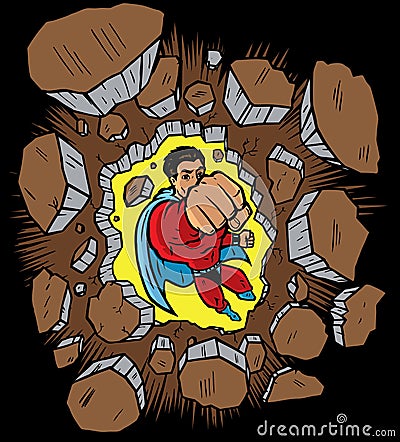Hitting the Wall
I hit the wall last night. Yes, I literally hit the wall, or, I guess I should say, the door. I had turned out the family room lights and was walking down the hall to get ready for bed when I remembered that I needed to move the wet laundry from the washer to the dryer. So, I scurried through the kitchen to the basement, switched the laundry, and headed back upstairs. This time, though, I strode through the dark family room toward the bedroom and, forgetting that the pocket door leading to the hallway was closed, I charged right into that solid, wooden door.
"Ouch!" doesn't even begin to describe the pain! My nose is still tender today, and I've had a splitting headache all day long. As a result, I can honestly say that I understand the true meaning of that idiom, "hit the wall."
Our oldest daughter, Erin was about fifteen when she really, truly, hit the wall. She was up long before the sun, just about ready to leave the house to catch an early morning bus from the high school, a block from our house, to Laramie, Wyoming, for a show choir competition. Erin had just turned off the kitchen light, and was hurrying toward the door, when Bill and I were jarred awake by an audible thud, followed by a reedy voice wailing, "Dadd-y-y-y!"
Bill jumped out of bed to find Erin in the kitchen, with blood gushing from a jagged gash on her forehead, the result of slamming headlong into the corner of the jutting, brick, fireplace wall. She really needed stitches, but the bus couldn't wait, and the show choir couldn't perform without their only pianist, so Bill and I cleaned her up, applied Steri-strips and a bandage, and dropped her off at the waiting bus with extra band-aids, an ice pack, and enough Tylenol to last for the whole day. That morning, we were especially grateful that her good friend's doctor-dad, who was chaperoning the trip, promised to keep an eye on her.
If I were following accepted essay format, I would probably give a third example of someone hitting the wall. Oh, there was that time, not so long ago, involving a certain daughter, and a car, and the garage door and adjacent brick wall, but I would rather not go into much detail about that unfortunate incident. So, instead, I'm going to write a little more about idioms.
The meaning of "hit the wall," when used colloquially, means something completely different than the actual words indicate. It is an idiom I use frequently, meaning that I've had enough, I'm exhausted, and I just need to stop what I've been doing, because I'm too tired to accomplish anything anyway. Most people who live in our country understand the meaning of the phrase. But American idioms, in general, form a roadblock for English language learners, because the words simply can't be taken literally.
Our youngest daughter, Victoria, didn't speak in sentences until she was five years old. After a slow start, she has worked hard to broaden her vocabulary, but idioms, in particular, have been difficult for her to understand. When she was in Junior High, a dedicated, caring, speech therapist spent a tremendous amount of time just reviewing the meanings of some of the most common idioms. Thanks to that therapist's extra effort, and Victoria's willingness to learn, our daughter finally has a pretty good grasp of basic idioms.

Oh, to have a super power or two! Wouldn't it be great if, instead of "hitting the wall," either literally or figuratively, we could just blast our way through the most challenging life events, like Superman on a mission? Alas, we are human, after all, so no super powers for us.
But, I'm grateful, beyond measure, that we have a loving, all-powerful God who promises to be with us always, even when we "hit the wall."
"And surely I am with you always, to the very end of the age." Matthew 28:20
"Ouch!" doesn't even begin to describe the pain! My nose is still tender today, and I've had a splitting headache all day long. As a result, I can honestly say that I understand the true meaning of that idiom, "hit the wall."
Our oldest daughter, Erin was about fifteen when she really, truly, hit the wall. She was up long before the sun, just about ready to leave the house to catch an early morning bus from the high school, a block from our house, to Laramie, Wyoming, for a show choir competition. Erin had just turned off the kitchen light, and was hurrying toward the door, when Bill and I were jarred awake by an audible thud, followed by a reedy voice wailing, "Dadd-y-y-y!"
Bill jumped out of bed to find Erin in the kitchen, with blood gushing from a jagged gash on her forehead, the result of slamming headlong into the corner of the jutting, brick, fireplace wall. She really needed stitches, but the bus couldn't wait, and the show choir couldn't perform without their only pianist, so Bill and I cleaned her up, applied Steri-strips and a bandage, and dropped her off at the waiting bus with extra band-aids, an ice pack, and enough Tylenol to last for the whole day. That morning, we were especially grateful that her good friend's doctor-dad, who was chaperoning the trip, promised to keep an eye on her.
If I were following accepted essay format, I would probably give a third example of someone hitting the wall. Oh, there was that time, not so long ago, involving a certain daughter, and a car, and the garage door and adjacent brick wall, but I would rather not go into much detail about that unfortunate incident. So, instead, I'm going to write a little more about idioms.
The meaning of "hit the wall," when used colloquially, means something completely different than the actual words indicate. It is an idiom I use frequently, meaning that I've had enough, I'm exhausted, and I just need to stop what I've been doing, because I'm too tired to accomplish anything anyway. Most people who live in our country understand the meaning of the phrase. But American idioms, in general, form a roadblock for English language learners, because the words simply can't be taken literally.
Our youngest daughter, Victoria, didn't speak in sentences until she was five years old. After a slow start, she has worked hard to broaden her vocabulary, but idioms, in particular, have been difficult for her to understand. When she was in Junior High, a dedicated, caring, speech therapist spent a tremendous amount of time just reviewing the meanings of some of the most common idioms. Thanks to that therapist's extra effort, and Victoria's willingness to learn, our daughter finally has a pretty good grasp of basic idioms.

Oh, to have a super power or two! Wouldn't it be great if, instead of "hitting the wall," either literally or figuratively, we could just blast our way through the most challenging life events, like Superman on a mission? Alas, we are human, after all, so no super powers for us.
But, I'm grateful, beyond measure, that we have a loving, all-powerful God who promises to be with us always, even when we "hit the wall."
"And surely I am with you always, to the very end of the age." Matthew 28:20



Comments
Post a Comment